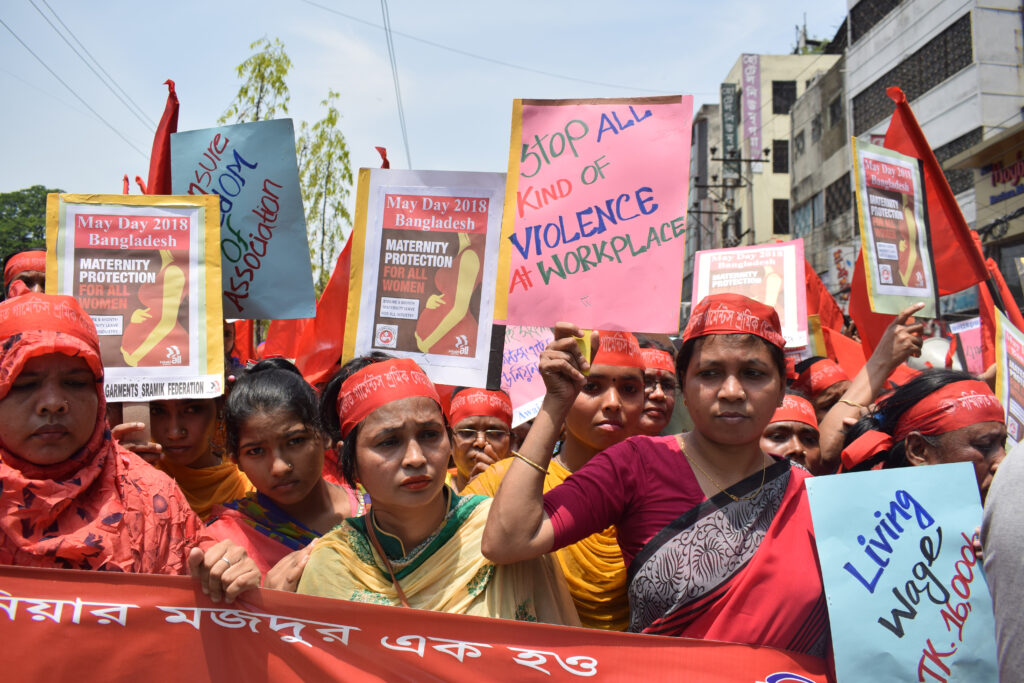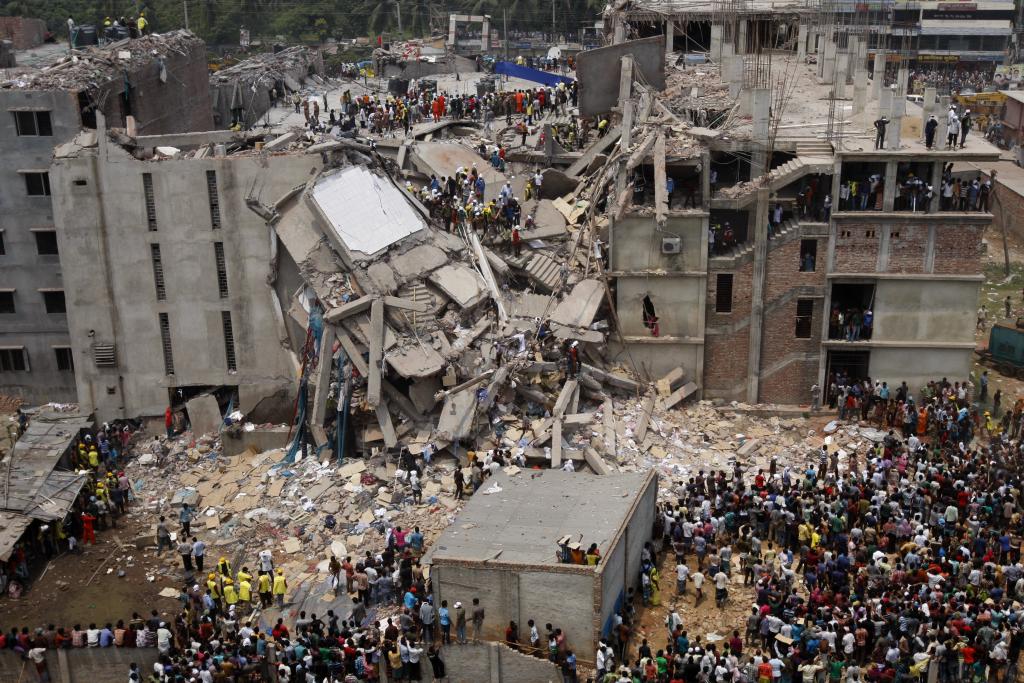Share Twitter Facebook Email Copy URL
Making the Decent Work agenda[i] a reality within the global value chains should be an urgent priority for the International Labour Organisation (ILO). With its global mandate to promote social justice, its experience and expertise, its normative role and its tripartite[ii] structure, the ILO is a one-of-a-kind multilateral body within the United Nations. Its position in the international arena allows it to address the contradictions and gaps that exacerbate or even create inequalities; based on criteria forged over the last hundred years at the tripartite level, it can pave the way for radical change and developments.
Working in global supply or value chains (GSCs and GVCs[iii]), both at global and domestic level, is one of the most significant features of the transformations that the organisation of labour underwent in the last decades. Their scope and overall impact are staggering. Eighty per cent of global trade takes place in “value chains” linked to multinational corporations (MNE, multinational enterprise)[iv]. It is estimated that one in five workers worldwide works in one of them[v]. As that most of the work in GSCs is in the informal sector, where casual workers, home-based workers without contract, agency workers and so-called atypical workers are employed – and therefore not covered by official data – this is a rather conservative estimate. Moreover, in the current context of the COVID-19 pandemic, some factors related to high unemployment and underemployment may increase precarity along global GSCs.
These changes are taking place against a backdrop of increasing speeds of communication and exchange and rapid technological innovation, with social justice, environmental sustainability, and their fundamental elements in severe crisis. Most workers in GSCs are concentrated in the informal economy, where they escape any form of control over respect for basic human and labour rights. They receive meagre wages, cannot organise or bargain collectively, are therefore exposed to serious health and safety risks, excluded from social protection, and live in poor or very poor conditions. The reality of work in GSCs stands in stark contrast to the narrative that has been propagated in recent decades that international decentralisation of labour would create prosperity. Instead, this kind of work is a dead end of exploitation, where human dignity is trampled, labour rights denied, poverty persists and hopes for a better, happier future for workers, their families and their communities are merely a mirage.

Most workers in the lowest paid areas of supply chains are women. They are often exposed to multiple forms of discrimination, harassment, and violence there. The garment industry is the most familiar example, yet not the only one. Thanks to the expansion of free trade zones around the world, it has become possible to hire the most vulnerable members of society as labour. The lowest level of manufacturing is predominantly located in these zones. Companies investing in these regions benefit from tax exemptions and a lack of control over the observance of workers’ rights. Freedom to organise is suppressed and the right to collective bargaining is generally disregarded. In some cases, sham unions are created to ostensibly meet the requirements, merely ticking the boxes and nothing more. These exemptions have a devastating impact on workers’ lives and communities, as well as on public services such as water supply, sanitation, health services and schools. Once again, this contradicts the narrative that decentralisation of labour creates wealth. The truth is that these processes create a vicious circle that promotes poverty, discriminations, inequality and obstacles to democratisation alike.
In 2016, after intense and controversial debate between workers, employers and governments[vi], the International Labour Conference (ILC) adopted a resolution on decent work in global supply chains, which states, among other things: “There is concern that current ILO standards may not be fit for purpose to achieve decent work in global supply chains”[vii]. It goes without saying that the wording of the resolution is the result of a compromise, the only consensual output possible at that time. Workers put pressure to open the debate for a new standard. The employers’ group in the ILO Governing Body (GB) strongly opposed such a debate. This brings to light the divergences between the social partners. They are in complete disagreement and thus incompatible, especially as they are guided by incompatible values and objectives. Therefore, the challenges were and are great, because employers stand in the way of new standards. They have worked for many years to undermine, if not extinguish (sic!) the ILO’s normative role and supervisory power, and have sought to reduce its role to that of a simple non-governmental organization (NGO). It all started when employers began to obstruct the recognition of the right to strike enshrined in Convention 87 and the proper functioning of the 90-year-old standards control mechanism as a whole. Later on, they opposed a debate on a possible convention on informal work or GSCs. Thus, the ILC Resolution on decent work in the global supply chains, although falling far short of workers’ expectations, could at least keep the debate open to some extent and pave the way for negotiations between the social partners until the political climate improves.
In June 2019, the International Labour Conference adopted the ILO Centenary Declaration for the Future of Work (the Centenary Declaration), which calls member States and social partners to ensure “that diverse forms of work arrangements, production and business models, including in domestic and global supply chains, leverage opportunities for social and economic progress, provide for decent work and are conducive to full, productive and freely chosen employment”[viii].
This needed to be followed up with further efforts. Therefore, as a follow-up the ILO Governing Body convened a technical tripartite meeting to address existing failures leading to deficits in decent work standards, identify key governance challenges to achieving decent work and consider possible guidelines, programmes, policies, initiatives or standards needed to achieve this. The meeting held in Geneva in February 2020 did not bring any progress on the approach of the Employers’ Group. On the contrary, their language and behaviour towards the world of work were once again aggressive. The differences between approaches, policies, content and language of the different participants were great and ultimately compromised the text adopted in the final declarations. To cite just only one example of many that was discussed at length at the meeting and impeded any progress on the final declaration, when the three groups examined the existing gaps in the body of international labour standards related to GSCs, the Employers’ Group, with the support of some governments, unilaterally rejected the ILO’s language referring to “standards” and pushed for them to be referred to instead as “normative and non-normative measures”. This difference in terminology is more than just a nuance: it reveals the employers’ efforts to weaken the instruments provided by historically and constitutionally enshrined international labour law in order to replace them with vague and indeterminate “measures” with no clear allocation of responsibilities in terms of compliance and implementation.
On this crucial issue, one of the sadly banal rituals of the international community is clearly being played out. Apparently, everybody agrees that further efforts and a strategy are needed to address the challenges that stand in the way of decent working conditions in supply chains. However, what usually happens when general statements by politicians need to be translated into concrete action: there was disagreement on key aspects, not just details. For instance, there was no agreement on whether efforts should include domestic supply chains and whether the specific role of governments, employers’ organisations and workers’ organisations should be taken into account in addressing shortcomings in ensuring decent work. In other words, employers refused to take any form of responsibility even in principle. The contradictions inherent in the issue were not addressed, for example the fact that companies, whether MNEs or domestic, deliberately exploit the possibility of subcontracting to avoid any responsibility. Instead, governments and social partners chose to postpone the discussion refer to a possible consensus in the distant future.
The latest step so far was for the ILO Governing Body to adopt a kind of two-process decision to find a consensual way out of this impasse. On the one hand, the ILO Office was asked to conduct an in-depth review by November 2021 “to clearly identify if there are any gaps in the current body of normative and non-normative measures, including means of implementation and other measures, to facilitate a discussion on options to ensure decent work in supply chains, including at sectoral level, where appropriate”[ix]. The review, which was to be presented and shared with the constituents, was intended as a basis for further assessment by another tripartite working group. This is a rather cumbersome procedure without concrete commitments, but at least it could help to keep the dialogue alive. On the other hand, this working group should at the same time develop the “building blocks” for a comprehensive strategy to achieve decent work conditions in supply chains, taking into account the ILO Centenary Declaration for the Future of Work 2019, the “One ILO” framework[x] and possible relevant outcomes of the 109th Session of the International Labour Conference (2021). These building blocks should be discussed during the March 2022 Governing Body meeting, with the aim of deciding on appropriate follow-up actions. Until this date in March 2022, the focus should be on looking at some factors that have an important impact on the discussion of supply chains.
COVID-19 had a serious impact on jobs in supply chains from the beginning of the pandemic. Risks to workers from COVID 19 included loss of employment and income, and health risks related to working conditions. These risks were elevated in certain supply chains linked to essential goods and services as well as for certain workers, such as migrant workers, workers in the informal economy and workers without social protection[xi]. As of December 2020, more than 190 million jobs – representing nearly one-third of all jobs in manufacturing supply chains and about 8 per cent of all jobs worldwide – were severely or moderately affected by the decline in consumer demand. Global employment losses reached an unprecedented high. As of October 2020, the number of severely affected jobs increased even further as many countries were hit by a second wave[xii]. Despite the hope that large-scale vaccination campaigns brought about, the global economy remains fraught with a high degree of uncertainty based on the International Monetary Fund (IMF) October 2020 economic forecasts. Moreover, recovery could unfold unevenly, perpetuating, reproducing or exacerbating existing inequalities, especially in the hard-hit sectors[xiii]. COVID-19 has had a major impact on international trade, causing a widespread sharp decline that has been less pronounced in countries of the Global South[xiv].

Most client companies are still located in the USA, the EU and other OECD member states, where governments are obliged to promote and enforce the OECD Guidelines for Multinational Enterprises. They require that human rights and core labour standards should be respected in all countries where these companies operate[xv]. The OECD Guidelines, which are based on ILO standards, are instruments that should be strengthened and used precisely with a view to development by reducing inequalities and striving for social justice. In fact, serious violations of workers’ rights are particularly frequent in branches and subsidiaries, and especially in subcontracting (e.g., the Rana Plaza disaster[xvi]; but there are many other lesser-known but equally serious cases). It is no coincidence that the United Nations Special Rapporteur on the Rights to Freedom of Peaceful Assembly and of Association and of Association warned in his statement on COVID-19 that “accounts of cases where labour representatives have faced retaliation for speaking out concerning dangerous situations at the workplace are particularly troubling”[xvii].
In order to raise awareness of and protect workers’ rights, it is of utmost importance to support and strengthen trade unions. Trade unions also play a fundamental role in overcoming obstacles that prevent workers, especially women, from accessing effective remedies for grievances. To fulfil this role, the ILO is working with the OECD, a collaboration that has already yielded concrete results, including through the contribution of the United Food and Commercial Workers International Union (UFCW) (see work on Rana Plaza). It is significant and should be strengthened. Global agreements between global sectoral trade union federations and MNEs should also be supported.
Mapping the activities of MNEs is becoming increasingly complex and important. MNEs, just like other companies, must comply with national, regional, and international laws. The United Nations Guiding Principles on Business and Human Rights call for business enterprises to fulfil their human rights due diligence obligations and oblige states, social partners and other actors to make efforts to promote this due diligence. The Guiding Principles are voluntary and practices to implement them vary widely. Their voluntary nature also leads to a distinct lack of accountability. Human rights due diligence is particularly relevant whenever it makes supply chains or supply chains more transparent. Existing international due diligence instruments, including those on corporate social responsibility, have failed to provide access to justice and redress for victims of human rights and environmental violations because they are not court-proof and voluntary. Companies should be required to disclose the names of all the companies involved in the supply chain, as well as figures on the workers employed, working conditions etc.
To ensure the effective implementation of the OECD Guidelines and ILO standards, common regulations and forms of cooperation are needed, such as the ILO Declaration on Fundamental Principles and Rights at Work (1998), the ILO Declaration on Social Justice for a Fair Globalisation (2008) and the ILO Tripartite Declaration of Principles concerning Multinational Enterprises and Social Policy (MNE Declaration). The trade model that puts extreme downward pressure on salaries and working conditions in some countries needs to be subjected to a comprehensive and thorough review. The ILO MNE Declaration, while not binding, is an important tool because of its tripartite nature, international geographic scope and the fact that it addresses relevant issues ranging from trade union freedom and the obligation to bargain collectively (collective bargaining and organised labour relations are almost non-existent in global supply chains) to other areas that directly impact the lives of workers and communities, such as the promotion of local employment, opportunities and the promotion of social justice. These include the promotion of local employment, equal opportunities and treatment, non-discrimination, training, working conditions, respect for age requirements, conflict resolution mechanisms, the right to information and consultation, etc. This text links legislative measures to labour relations and takes into account the social and environmental impact of economic activities.
The context of the pandemic could also allow for outcomes on occupational health and safety in supply chains in the upcoming debates. At the ILO Centenary, workers called for the inclusion of t occupational health and safety standards in the list of four fundamental principles and rights at work that can be implemented without ratification. The employers’ group opposes this request. This will be a major challenge for further talks, especially in the context of the difficult situation worldwide, which requires a strong response to better protect workers’ health and lives.
Technology, including artificial intelligence, robotics and sensors, is at the heart of many debates about the future of work, inside and outside the ILO. The relevant research processes have not yet enabled stakeholders to fully grasp these issues. The focus should certainly be on the potential for technological innovation that could improve workers’ conditions—not only on the basis of IT as such, but also based on its adequate design, use and objectives. In terms of global supply chains, the basic use of data mining could be a useful tool for labour administrations to identify high-risk sectors and improve their labour inspection systems. Digital technologies such as apps and sensors could make it easier for companies and social partners to monitor working conditions and labour law compliance in supply chains[xviii]. Thanks to this multi-layered approach, the global trade union movement has a unique opportunity to lead the debate and establish a positive relationship with the Decent Work Agenda and a global Green New Deal, as the corporate -based models are no longer sustainable not only for workers but also for the planet.
Global supply chains are not a phenomenon linked to development issues, North-South relations or relations between developed and emerging economies. They require universally accepted policy responses that are coherently articulated at different levels to affirm the primacy of politics vis-à-vis MNEs and economic and capital powers. Due to their global nature, these phenomena require global cooperation between groups of countries and between organisations with an international mandate.
The ILO and the entire international community have the opportunity to speak out loud and clear and act on this demand, prioritising the most vulnerable people in our society who are excluded, silenced and exploited. This is an inescapable and globally interconnected issue where social justice, peace and democracy are at stake.
Silvana Cappuccio, Senior Officer in the Department of International Politics, Italian General Confederation of Labour (CGIL), Italy
[i] In 2008, the ILO adopted its “Declaration on Social Justice for a Fair Globalization”, in which it stresses its key role in promoting progress and social justice in the context of globalisation, through the Decent Work agenda. The Decent Work agenda is defined as being based on an integrated and gender-mainstreamed approach consisting of four pillars, which are productive and freely chosen work, rights at work, social protection, and social dialogue.
[ii] The ILO works through the International Labour Conference and the Governing Body, which bring Governments’, employers’, and workers’ representatives together. International labour standards and broad policies are adopted through a tripartite consensus procedure.
[iii] According to the European Union directive proposal: ‘supplier’ refers to any undertaking that provides a product, part of a product, or service to another undertaking, either directly or indirectly, in the context of a business relationship and ‘value chain’ refers to all activities, operations, business relationships and investment chains of an undertaking and includes entities with which the undertaking has a direct or indirect business relationship, upstream and downstream, and which either supply products, parts of products or services that contribute to the undertaking’s own products or services, or receive products or services from the undertaking. See https://www.europarl.europa.eu/doceo/document/TA-9-2021-0073_EN.html
[iv] UNCTAD, Global Value Chains and Development, 2013 https://worldinvestmentreport.unctad.org/wir2013/chapter-4-global-value-chains-and-development/
[v] ILO Research Paper No.16, Linking jobs in global supply chains to demand, August 2016 https://www.ilo.org/global/research/publications/papers/WCMS_512514/lang–en/index.htm
[vi] Also knows as the three constituent groups of ILO https://www.ilo.org/global/about-the-ilo/who-we-are/tripartite-constituents/lang–en/index.htm
[vii] 105th Session of the International Labour Conference, Resolution concerning decent work in the global supply chains, 2016 https://www.ilo.org/ilc/ILCSessions/previous-sessions/105/texts-adopted/WCMS_497555/lang–en/index.htm
[viii] ILO Centenary Declaration, June 2019 https://www.ilo.org/global/about-the-ilo/mission-and-objectives/centenary-declaration/lang–tr/index.htm
[ix] ILO GB 341 Record of decision, March 2021 GB.341/INS/13/2/Decision: Decision concerning the update on the report of the Technical Meeting on Achieving Decent Work in Global Supply Chains (Geneva, 25–28 February 2020) (ilo.org)
[x] ILO GB 337 Mid-term report on the implementation of the ILO programme of action on decent work in global supply chains, October 2019 https://www.ilo.org/gb/GBSessions/GB337/ins/WCMS_722485/lang–en/index.htm
[xi] ILO Research Brief, The effects of COVID-19 on trade and global supply chains, June 2020 Research Brief: The effects of COVID‑19 on trade and global supply chains (ilo.org)
[xii] Report of the Director General regarding the Report of the Technical Meeting on Achieving Decent Work in Global Supply Chains (Geneva, February 25-28th, 2020) https://www.ilo.org/gb/GBSessions/GB341/ins/WCMS_771738/lang–en/index.htm
[xiii] ILO Monitor: COVID-19 and the world of work. Seventh edition https://www.ilo.org/global/topics/coronavirus/impacts-and-responses/WCMS_767028/lang–en/index.htm
[xiv] UNCTAD, Key Statistics and Trends in International Trade 2020 https://unctad.org/webflyer/key-statistics-and-trends-trade-policy-2020
[xv] https://www.oecd.org/corporate/mne/
[xvi] https://cleanclothes.org/news/2021/commemorating-the-rana-plaza-anniversary-by-preventing-the-next-disaster
[xvii] https://www.ohchr.org/en/NewsEvents/Pages/DisplayNews.aspx?NewsID=25788&LangID=E
[xviii] ILO Global Commission on the Future of Work, Work for a brighter future, 2019 https://www.ilo.org/global/publications/books/WCMS_662410/lang–en/index.htm



